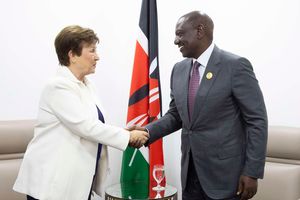
President William Ruto.
In the run-up to the 2022 election, President William Ruto promised to eliminate corruption, insisting every public shilling would be accounted for. “There will be no money to steal,” he declared.
Yet two years into his presidency, Ruto’s administration is dogged by scandals, with critics accusing him of failing to match his tough talk with action.
A Public Service Commission report showed the government lost Sh650 million through corruption in his first year.
Of 109 reported cases, only 34 made it to court – and just four led to convictions. Kenya also slid three positions in Transparency International’s global corruption index, from 123 to 126.
Despite repeated pledges, including a vow in Murang’a that “there will be no sacred cows,” major scandals have rocked his government – from the Kemsa mosquito nets and condemned sugar saga to the fake fertiliser and edible oils scams.
Opposition leaders and civil society argue the President has failed to lay down a clear anti-graft marker. Treasury Cabinet Secretary (then MP) John Mbadi noted Ruto avoids calling out corruption directly. “He cuts corners with language. If there’s one area that must be top-down, it’s corruption,” said Mbadi.
More recently, former Attorney General Justin Muturi accused Ruto of pressuring him to approve a Sh129 billion Russian tree-planting deal without Treasury approval. “Whenever Ruto comes up with a project, it’s for money-making,” he claimed.
Ruto has blamed other institutions for stalling the war on graft, accusing the DPP, EACC, Judiciary and even Parliament of dragging their feet.
He faulted courts for delaying graft rulings, Parliament for watering down the Conflict of Interest Bill, and Treasury for failing to implement the e-procurement system nearly a decade on.
During his 2024 State of the Nation address, Ruto warned: “There is no reason for corruption cases to drag when courts determine election petitions in six months.” He urged Parliament to stop stalling the Conflict of Interest Bill, suggesting some MPs may have vested interests.
While EACC reported ongoing investigations into over 400 cases worth Sh50 billion and filed civil suits to recover Sh9.2 billion in assets, critics say convictions remain too few and far between.
To his credit, Ruto has made high-profile sackings and suspensions. Last year, six parastatal CEOs and 67 police officers were suspended over procurement and corruption claims. Cabinet reshuffles have also edged out some officials tainted by scandal.
But transparency watchdogs remain unconvinced. A 2023 report by Transparency International Kenya faulted Ruto’s administration for appointing individuals under investigation or facing graft charges, flouting Chapter Six of the Constitution.
Azimio leader Raila Odinga has pushed for the prosecution of senior officials, including CSs Njuguna Ndung’u and Davis Chirchir, over the government-to-government oil deal. Odinga claimed Sh42.9 billion was illegally withdrawn without Parliament’s nod.
Chirchir, a close Ruto ally, has faced past corruption allegations, including during the Kenyatta era, when he was forced out alongside Felix Koskei, Michael Kamau and Kazungu Kambi.
As scandals persist and accountability lags, critics warn that without firmer action, Ruto’s anti-graft crusade risks becoming another political slogan – long on rhetoric, short on results.
Critics argue that Ruto’s failure to decisively deal with corruption risks entrenching a culture of impunity within government ranks.
With high-ranking officials rarely prosecuted– let alone convicted – the perception is growing that political loyalty offers insulation from accountability. This perception, observers say, could further erode public trust in state institutions.
Civil society groups have also flagged the weakening of watchdog institutions. Funding constraints, political interference, and selective application of the law have undermined agencies such as the EACC and the Office of the Auditor General.
These gaps have allowed corruption networks to adapt and thrive, often operating in plain sight with little fear of consequences.
Analysts say Ruto’s political base and coalition dynamics may be partly to blame. With a fragile alliance to maintain and multiple interests to balance, the President may be reluctant to go after powerful figures whose support he needs ahead of the 2027 elections. In this context, even well-intentioned anti-graft efforts risk being seen as politically calculated or symbolic.
Still, Ruto has time to change course. Enacting tougher laws, depoliticising oversight bodies, ensuring swift prosecution of major graft cases, and protecting whistle-blowers would signal real resolve.
Anything less risks reducing his much-publicised “bottom-up” governance model into mere rhetoric – while corruption continues to bleed the country dry.






